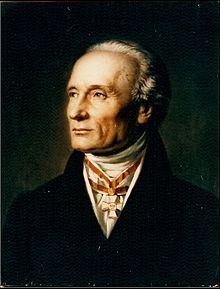Friedrich Philipp Rosenstiel
Friedrich Philipp Rosenstiel (born October 2, 1754 in Mietesheim in Alsace, County Hanau-Lichtenberg , † May 18, 1832 in Berlin ) was a Prussian civil servant and director of the Royal Prussian Porcelain Manufactory and Prussian State Council .
family
He was the son of the Evangelical Lutheran preacher and assessor of the Consistory of Buchsweiler Johann Heinrich Rosenstiel (1718–1798) and Anna-Margarete Loutherbourg (1721–1808). In 1781 he married Luise Elisabeth Decker (1764–1832), a daughter of the upper court printer Georg Jacob Decker . With her he had six sons and four daughters, including Henriette (1784-1832), with the graphic artist and sculptor Johann Gottfried Schadow , with the Privy-Bergrat, and Adelaide (Lyda) (1788-1861) Carl Karsten were married . His son Wilhelm (1789–1871), who had become the owner of the Decker Hofbuchdruckerei in Posen , received the hereditary nobility ( von Rosenstiel ) in 1845 . Friedrich Philipp's older brother was Heinrich Karl Rosenstiel .
Life
After training at the grammar school in Buchsweiler, which he left at the age of fourteen with the certificate “complete maturity for university”, he studied with Johann Wolfgang von Goethe in Strasbourg under Johann Schweighäuser , Johann Daniel Schöpflin , Jeremias Jakob Oberlin and Christoph Wilhelm von Koch theology and law. At the age of nineteen he took on a position as a tutor in the von Stein family's house for the younger brother of the future Prussian State Minister . Here he met his future sponsor, the Prussian minister Friedrich Anton von Heynitz . This brought him to Berlin in 1777 and gave him a position as assessor in the mine and smelter administration. After being promoted to Berg- in 1781 and to Ober-Bergrat in 1786, which in 1787 involved membership of the newly established Royal Porcelain Manufactory Commission, he became a full member of the Academy of Arts in 1790 . In 1802 he was given the management of the porcelain factory, in 1804 he was appointed to the secret chief finance councilor and war and domain council of the mining and smelting department. In these functions, the king sent him to Paris in 1805 and to Vienna in 1815. Since 1810 his activity was limited to the Royal Porcelain Manufactory. From 1821 Georg Frick was his technical co-director there.
He was in contact with numerous well-known contemporaries such as Karl Wilhelm Ramler , Johann Jacob Engel , Friedrich Nicolai , Wilhelm Abraham Teller , Dietrich Ludwig Gustav Karsten , Carl Friedrich Zelter and Friedrich Schleiermacher .
In 1781 Rosenstiel joined the Berlin Freemason Lodge Zur Eintracht , which belonged to the Great National Mother Lodge "To the Three World Balls" , of which he later became the Grand Master. He was a long-time member of the Monday Club . The king awarded him the Order of the Red Eagle, 2nd and 3rd class.
Friedrich Philipp Rosenstiel died in Berlin in 1832 at the age of 77. He was buried in the Trinity Cemetery in front of the Potsdamer Tor . The grave was lost when the cemetery was leveled in 1922 at the latest.
Publications
- Theodor Schmalz: Encyclopaedie der Cameralwissenschaften. (Rosenstiel was a co-author of the improved edition Königsberg 1819, digitized ).
literature
- Friedrich August Schmidt, Bernhard Friedrich Voigt: New Nekrolog der Deutschen (Volume 10, Part 1). 1834, pp. 392-397 ( digitized version ).
Web links
- Biography from an excerpt from the registration of the Academy of the Arts
Individual evidence
- ↑ Joseph Meyer: The great conversation lexicon for the educated classes . Volume 6. 1851, p. 357; Nadja Stulz-Herrnstadt: Berlin bourgeoisie in the 18th and 19th centuries. Berlin, New York 2002, p. 358.
- ↑ Christian ROSE STIEHL: family history of Christian Rosenstiehl. In: Geneanet. Retrieved September 5, 2018 .
- ↑ a b c d e f g h New Nekrolog. Ilmenau 1834
- ^ Gothaisches Genealogisches Taschenbuch. Noble houses. 1921, p. 704.
- ^ Nadja Stulz-Herrnstadt: Berlin bourgeoisie in the eighteenth and nineteenth centuries, Walter de Gruyter, 2002, pages 226,227, books.google.de
- ↑ Grumnach: Goethe, Encounters and Conversations. Berlin 1965, p. 186 (quotation from a letter by A. v. Goethe to his father).
- ^ Andreas Reich: Friedrich Schleiermacher as pastor at the Berlin Trinity Church 1809 - 1834 . Walter de Gruyter, 2011, p. 307 .
- ↑ Johann Wolfgang von Goethe / Carl Friedrich Zelter: The correspondence between Goethe and Zelter . Ed .: Max Hecker. 3rd vol. 1828-1832 . Insel, Leipzig, p. 503 .
- ↑ History of the Great National Mother Lodge in the Prussian States called to the three globes , Berlin 1903, p. 496.
- ^ Hans-Jürgen Mende : Lexicon of Berlin burial places . Pharus-Plan, Berlin 2018, ISBN 978-3-86514-206-1 , pp. 152–153.
| personal data | |
|---|---|
| SURNAME | Rosenstiel, Friedrich Philipp |
| BRIEF DESCRIPTION | Prussian civil servant and director of the Royal Porcelain Manufactory |
| DATE OF BIRTH | October 2, 1754 |
| PLACE OF BIRTH | Mietesheim , County of Hanau-Lichtenberg |
| DATE OF DEATH | May 18, 1832 |
| Place of death | Berlin |
